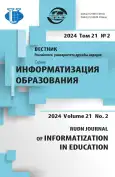Evaluation of digital competence level among educators: assessment tools
- Authors: Osipovskaya E.A.1, Dmitrieva S.Y.2, Savelyeva A.A.3
-
Affiliations:
- University of Porto
- Perm National Research Polytechnic University
- University of Tyumen
- Issue: Vol 21, No 2 (2024)
- Pages: 181-195
- Section: DIGITAL EDUCATIONAL ENVIRONMENT
- URL: https://journal-vniispk.ru/2312-8631/article/view/321366
- DOI: https://doi.org/10.22363/2312-8631-2024-21-2-181-195
- EDN: https://elibrary.ru/LYGYLL
- ID: 321366
Cite item
Full Text
Abstract
Problem statement. The goal of this study is to conduct a theoretical analysis of the three most commonly used self-reflection tools that evaluate educators' digital competences: SELFIEforSchools, SELFIEforTEACHERS, and the Digital Competence Wheel. The research seeks to address two key questions: 1) what digital competences are crucial for educators in the present day? 2) which assessment tools have been extensively validated for measuring these competences? Methodology . A pilot test was conducted on the Digital Competence Wheel to assess its potential for evaluating digital competences and its potential application in higher education settings. Results . The unprecedented use of technology in education and training as a result of the pandemic COVID-19 has been recorded. This shift to online learning has accelerated and introduced new challenges and changes to educators' roles and skillsets. The growing demand to develop and utilize proper digital competences in the teaching environment has become an essential component of modern higher education systems. Conclusion . Digital competences encompass a combination of knowledge, skills, and attitudes related to the effective use of technology for performing tasks, problem-solving, and secure, creative, independent, and ethical communication. The Digital Competence of Educators framework is one of the two main comprehensive tools specifically designed to support educators, teachers, and trainers.
About the authors
Elizaveta A. Osipovskaya
University of Porto
Author for correspondence.
Email: e.osipovskaya@gmail.com
ORCID iD: 0000-0002-4192-511X
PhD student of Doctoral Program in Digital Media
265 Rodrigues de Freitas Ave, Porto, 4099-002, Portuguese RepublicSvetlana Yu. Dmitrieva
Perm National Research Polytechnic University
Email: s.y.dmitrieva@gmail.com
ORCID iD: 0000-0003-0365-6526
PhD in Philology, Associate Professor, Department of Foreign Languages and Public Relations
29 Komsomolsky Prospekt, Perm, 614990, Russian FederationAnastasiia A. Savelyeva
University of Tyumen
Email: an.a.saveleva@utmn.ru
ORCID iD: 0000-0002-7727-9850
expert, School of Education
18 Semakova St, Tyumen, 625003, Russian FederationReferences
- Cabero-Almenara J, Gutiérrez-Castillo J-J, Palacios-Rodríguez A, Barroso-Osuna J. Development of the teacher digital competence validation of DigCompEdu check-in questionnaire in the university context of Andalusia (Spain). Sustainability. 2020;12(15): 6094. https://doi.org/10.3390/su12156094
- Bakator M, Radosav D. Analyzing the digital education revolution. International Conference on Information Technology and Development of Education-ITRO, October 2020. Zrenjanin; 2020.
- Garzón Artacho E, Martínez TS, Ortega Martín JL, Marín Marín JA, Gómez García G. Teacher training in lifelong learning - the importance of digital competence in the encouragement of teaching innovation. Sustainability. 2020;12(7):2852. https://doi.org/10.3390/su12072852
- Trubavina I, Dotsenko S, Naboka O, Chaikovskyi M, Meshko H. Developing digital competence of teachers of humanitarian disciplines in the conditions of COVID-19 quarantine measures. Journal of Physics: Conference Series. 2021;1840(1):012052. https://doi.org/10.1088/1742-6596/1840/1/012052
- Feng W, Zong W, Wang F, Ju S. Severe acute respiratory syndrome coronavirus 2 (SARS-CoV-2): a review. Mol Cancer. 2020;19(1):100. https://doi.org/10.1186/s12943-020-01218-1
- Kotlyarova IO, Volchenkova KN, Semenova YV, Chuvashova AD, Lyashenko MV. Development of digital competence of technical specialists in the electronic information and education environment. Quality Management, Transport and Information Security, Information Technologies: 2019 International Conference (IT&QM&IS). Sochi; 2019. p. 617-621. https://doi.org/10.1109/ITQMIS.2019.8928400
- Gilster P. Digital literacy. New York: John Wiley; 1997.
- Joosten T, Pasquini L, Harness L. Guiding social media at our institutions. Planning for Higher Education. 2012;41(1):125-135.
- Bennett L. Learning from the early adopters: developing the digital practitioner. Research in Learning Technology. 2014;22:21453-21466. https://doi.org/10.3402/rlt.v22.21453
- Traxler J, Lally V. The crisis and the response: after the dust had settled. Interactive Learning Environments. 2016;5(SI):1016.
- Chan BS, Churchill D, Chiu TK. Digital literacy learning in higher education through digital storytelling approach. Journal of International Education Research. 2017;13(1): 1-16. https://doi.org/10.19030/jier.v13i1.9907
- Falloon G. From digital literacy to digital competence: the teacher digital competency (TDC) framework. Educational Technology Research and Development. 2020;68(5):2449-2472. https://doi.org/10.1007/s11423-020-09767-4
- Krumsvik RJ. Digital competence in Norwegian teacher education and schools. Hogre Utbildning. 2011;1(1):39-51.
- Scuotto V, Morellato M. Entrepreneurial knowledge and digital competence: keys for a success of student entrepreneurship. Journal of the Knowledge Economy. 2013;4(3): 293-303. https://doi.org/10.1007/s13132-013-0155-6
- Cazco GHO, González MC, Abad FM, Mercado-Varela MA. Digital competence of the university faculty: case study of the universidad nacional de Chimborazo. TEEM'16: Proceedings of the Fourth International Conference on Technological Ecosystems for Enhancing Multiculturality. New York: Association for Computing Machinery; 2016. p. 147-154. https://doi.org/10.1145/3012430.3012510
- Martin A, Grudziecki J. DigEuLit: concepts and tools for digital literacy development. Innovation in Teaching and Learning in Information and Computer Sciences. 2006;5(4):249-267. https://doi.org/10.11120/ital.2006.0504024
- Ferrari A. DIGCOMP: a framework for developing and understanding digital competence in Europe (Report EUR 26035 EN). JRC Technical Reports. Seville: Institute for Prospective Technological Studies; 2013.
- Alenezi M, Wardat S, Akour M. The need of integrating digital education in higher education: challenges and opportunities. Sustainability. 2023;15(6):4782. https://doi.org/10.3390/su15064782
- Pietro G, Biagi F, Costa P, Karpinski Z, Mazza J. The likely impact of COVID-19 on education: reflections based on the existing literature and recent international datasets. Luxembourg; 2020. https://doi.org/:10.2760/126686
Supplementary files









